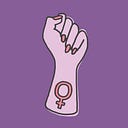

Discover more from Liberating Motherhood
Your postpartum depression is probably your male partner's fault
Also, I got temporarily banned from Facebook so you should subscribe to my work here.
Why Unkind Men, Not Hormones, Are the Leading Cause of Postpartum Depression
A few days ago, I was reading an online mom forum. A woman shared her experience so far: her husband refused to “babysit” the baby. The one time she left him with the baby so she could go to the grocery store, the baby rolled off of the couch where he had so recklessly left her. She was waking multiple times a night. He refused to get up, in spite of being on paternity leave. She was recovering from major surgery, but was still cooking and cleaning for him. And she wanted to know if she was being “dramatic” and “unreasonable” by asking her husband to take her older child for a few hours once a week.
The most popular response on the forum:
“Have you been screened for postpartum depression?”
As my friend Kathzilla likes to say (btw go check out her amazing art): Society is oppressing us into postpartum depression. Too often we diagnose postpartum depression when what we really mean is postpartum oppression.
This poster’s problem was clearly that she didn’t have enough time and sleep—and that her partner, who was able to step up and provide her with more of both by being less of a lazy, worthless piece of shit—had elected instead to relax and occasionally endanger her baby’s life.
I don’t know a single woman with postpartum depression whose partner shoulders a fair share of the load, or who truly cared for them in the postpartum period. Do you?
So why is it that we will blame anyone and anything other than the lazy man sleeping in bed next to the exhausted, sobbing woman?
The Myth of Women and Their Crazy Hormones
Navigate to any website about postpartum depression and you’ll promptly be informed that hormones cause it. The scientific research does not in any way support this claim.
In the first two weeks after birth, hormones are shifting wildly, and this is associated with a risk of mood swings. That’s why most people report some form of baby blues after birth. But the hormonal swings of the postpartum period only last 6 to 8 weeks. Thereafter, if a mother is breastfeeding, her estrogen levels remain low. And otherwise, they return to normal. Neither can explain postpartum depression. Here’s why:
Women spend their entire lives hearing that their estrogen makes them crazy and unstable. Virtually every consumer health site claims that estrogen is the reason women have higher rates of depression (never mind the fact that research on the subject suggests that men are just less likely to report depression). Yet estrogen levels drop in the postpartum period. And research on post-menopausal women suggests that they have lower rates of depression and improved well-being.
Either estrogen is making things worse, in which case it’s not causing postpartum depression. Or it’s not, in which case hormones aren’t to blame for depression. We can’t have it both ways.
Moreover, people with postpartum depression almost never get their hormone levels checked. And studies on postpartum depression tend not to check hormone levels either. So there’s zero compelling evidence that any specific hormonal swing causes postpartum depression. There’s overwhelming evidence, though, that sleep deprivation, unkind treatment, malnourishment, exhausting work, lack of social support, and the other experiences that are par for the postpartum course do cause postpartum depression.
It’s time we stop gesturing broadly at women, muttering, “hormones,” and using that to explain away the terrible way we treat them. Especially when there’s ample evidence that women face massive stress, abuse, and trauma after giving birth.
Men: The Real Cause of Most Postpartum Depression
The typical postpartum experience begins with a difficult birth, inadequate support for recovery, and endless demands from family members. When men have medical issues, their partners care for them. When women do, their partners are angry at them for not continuing to do everything. So the typical postpartum woman goes home to a house she’s still expected to clean, to meals she’s still expected to make. To sleeplessness. To a partner who doesn’t care about her emotions or well-being. To kids who need her. And she just can’t do it all.
In a 2020 study, the strongest predictor of postpartum depression (other than prenatal depression) was abuse. And who is abusing women in the postpartum periods? Their partners. Another found that general social support, and social support specifically from the baby’s father, were important protective factors, and their absence a key postpartum depression risk factor.
A 2015 study found that sleep deprivation predicted postpartum depression. Male partners lose an average of just 13 minutes of sleep in the postpartum period. Your shitbag husband is buying his sleep with your mental health. He’d rather risk your suicide than get up with the baby he helped to make.
Other research echoes these conclusions, finding that any form of abuse, not just physical abuse, can cause postpartum depression.
My own research paints a horrifying portrait of postpartum life, showing that abuse is not just common, but typical.
No wonder so many of us end up depressed. And the research proves that men are the main culprit. We’ve taught women that their time doesn’t matter. We’ve told them that they can’t expect help from their partners. We’ve turned male laziness into a joke. And then, when women can’t do it all on their own, we use mom-guilt to make them feel inadequate, and to convince them to keep trying in the futile effort to live up to society’s vision of motherhood.
Why Don’t We Call Postpartum Depression What it is?
So if the evidence is so clear that men play a central role in postpartum depression, why don’t we tell people that?
Why don’t doctors write prescriptions for more sleep? Why don’t midwives tell husbands to get off of their lazy asses?
For the same reason we think men shouldn’t know that children need food, or that their partners have feelings.
Patriarchy teaches us that women just matter less. It’s completely reasonable for a man to buy his free time and sleep with his partner’s exhaustion, no matter the cost to her or her children. In a patriarchal society, asking men to give something up is unthinkable.
But until we do, suicide will continue to be a leading cause of postpartum death.
And women will continue to believe that their depression is their fault.
Stop gaslighting women about postpartum depression. Depression is the natural, logical reaction to the circumstances in which we expect women to mother.
An Alternative Postpartum Depression Checklist
Postpartum depression checklists tend to focus on the individual, treating the depression as innate to them, rather than the context in which they are recovering from birth. I propose an alternative list of questions:
If you answer no to two or more of the following, your postpartum mental health issues are probably your partner’s fault:
Is your partner doing at least half of the housework while you recover from birth?
Is your partner doing at least half of the non-breastfeeding parenting while you recover from birth?
Is your partner either waking up with the baby, or doing other things to ensure you can sleep, such as letting you sleep in?
Has your partner shown you consistent care and compassion in the postpartum period?
Can you trust your partner to safely and competently care for your baby?
Was your partner supporting and loving during your birth?
Has your partner shown concern for your physical well-being as you recover from birth?
If you answer yes to any of the following, your postpartum mental health issues are probably your partner’s fault:
Has your partner pressured you to have sex, especially before the 6 week mark?
Has your partner forced you to have sex?
Has your partner yelled at you or called you names?
Has your partner called you dramatic or hysterical?
Has your partner ignored you when you cried or asked for emotional support?
Has your partner hit you?
Has your partner broken or thrown objects?
Has your partner pressured you to lose weight, or insulted your postpartum body?
Has your partner enlisted other people to insult you, or failed to protect you from his family?
Do you feel afraid of your partner?
Has your partner mocked your emotions?
Do you feel called out or angry about this post? Are you contemplating reminding me that it’s not all men? Pause. Of course it’s not all men. Many men are loving and supportive partners during the postpartum period. But if this post makes you feel defensive, you’re not one of them.
This Week’s Most Popular Posts
Click each image to view the post on Facebook.
I Got Banned From Facebook
Facebook banned me for 24 hours last week. My crime? Noting that road rage incidents are common in the United States, and that men shoot people over them.
Yes, I’m serious. I posted this comment in response to a British woman sharing a story in which she got into a loud road rage altercation with a cab driver:
Protecting “certain groups of people,” indeed. Like men. Because no matter how egregious the threats I flag against women are, they never get taken down. There are entire Facebook pages and ecosystems devoted to tearing down women, Black people, immigrants, and other minorities. These are all just fine in the eyes of our censorious overlords.
Correctly state that gun violence is common among men, though, and oh boy.
I’ve previously gotten in trouble for asserting that men are not innately stupid and can see when housework needs to be done. Yes, really.
Facebook can do whatever it wants. It’s not infringing on my legal right to free speech. But it is decidedly controlling public discourse. Its algorithm prioritizes certain content—especially apolitical and non-feminist content—thereby controlling what you see and potentially shaping your thoughts.
This is why I’m trying to reduce my reliance on Facebook. It’s actually the reason I initially came to Substack. If you value my work, you can really help by sharing Substack posts, and by becoming a free or paid subscriber. The more people move here, the less I have to worry about censors.




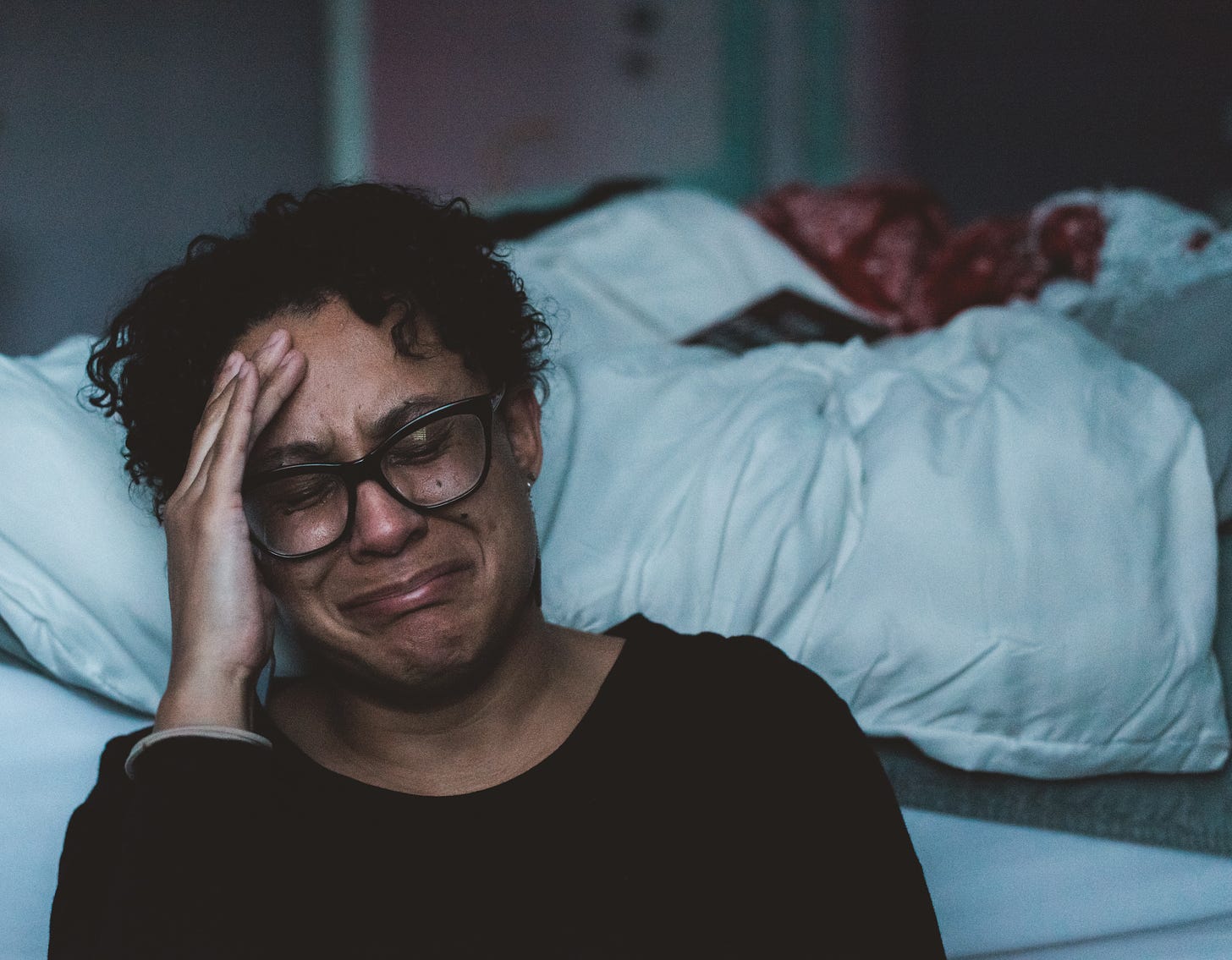
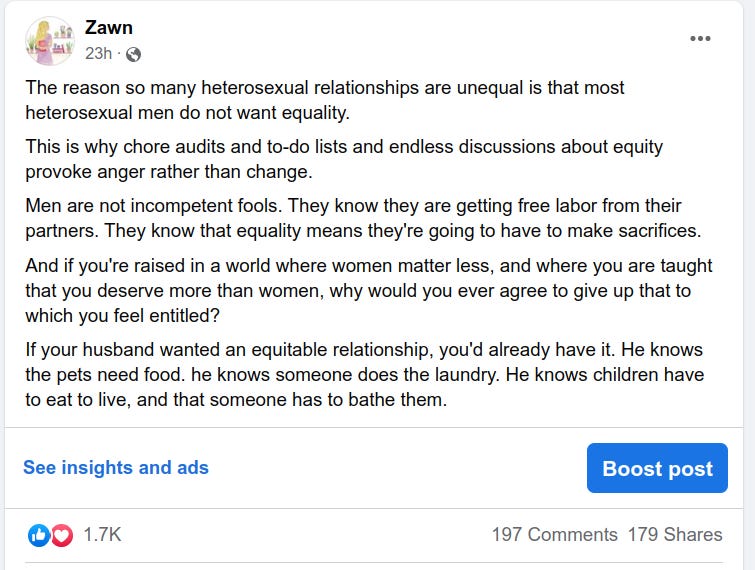
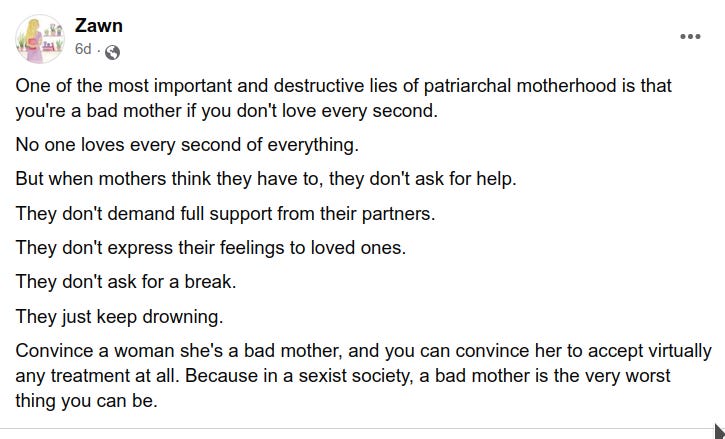
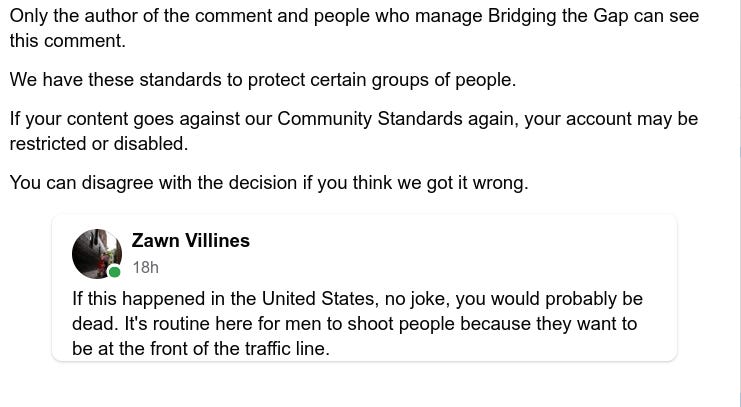




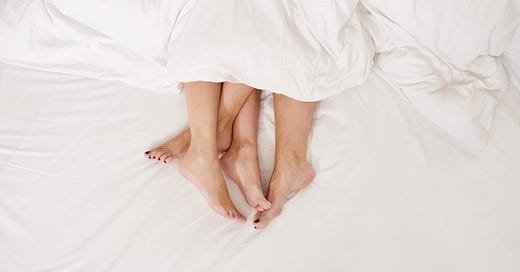



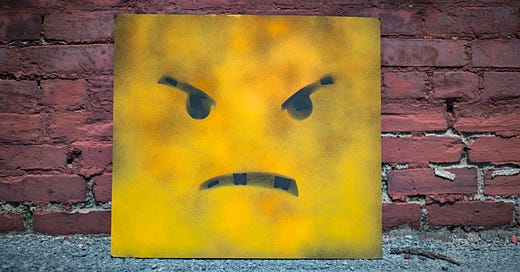

Oh my. I've never seen this articulated so clearly! Thank you for laying out what is really the most logical explanation, cutting through the crap we've been told for so long. My PPD got worse with each childbirth - I'll never forget laying next to my sleeping partner after giving up finishing my PhD and moving across the country for his job, with a toddler and newborn. Laying there bawling at who knows what hour of the morning, after getting up for at least the third time already, crying because I knew I'd be hearing a crying baby within an hour, crying harder because I was crying instead of sleeping. I told him the next day that I'd keep doing what I had to do to take care of the children, but there was absolutely going to be a cost for it someday. After #3, I remember seeing him walk out the door all shiny and dressed for work, while I sat crumpled on the floor staring at three children and weeping. He punished me for a year for putting off having #4 because I needed to recover. When we went before the judge years later for temporary custody orders for the divorce, he tried to get full custody because of my "mental breakdown at the end of graduate school." Thankfully the judge saw right through that nonsense.
My ex had everyone, including my family and MYSELF at one point believing I had PPD. My best friend who was an OB/GYN nurse had to snap me back to reality and assured me that I did not. It was his excuse for my reaction to his bs and the neglect I was suffering. It was his incompetence and continued abuse. When you suddenly have a literal child to care for you don’t have time or patience for the man baby you once did. I was starting to see the light, my attention was on baby and he was no longer the main character in his false reality. My boundaries, lack of patience and plain apathy towards his usual manipulation and means for attention were such a blow to his ego that he tried flipping the script on me. When playing the victim didn’t work he began shaming me for the state of the house, my hygiene, and finally my parenting. He knew I was raised in a family that saw those things as moral defects as so many of us are. Another attempt to make me feel inferior and unworthy of his love.
After a DV incident which led to his arrest he frantically tried to convince the police that I had PPD and I was being hysterical by making a false report. Regardless of the evidence, several eye witnesses and the 911 operator hearing his maniacal ramblings, the police still questioned me thoroughly, inquired about medication i was prescribed for something completely different and for a moment he almost had them convinced as well!! After his arrest and removal from our lives my symptoms of “PPD” magically went away as well!! Unfortunately they’re replaced with trauma, emotional deregulation and being stuck in survival mode. All of which had nothing to do with hormones and everything to do with his years of abuse. I will also never forget the ease in which the term “postpartum depression” spoken from a man’s mouth to six male police officers nearly caused me to be sent to a psychiatric hospital for crisis intervention. I’ll never forget how he used it to turn people who had known me my entire life, my closest family members against me because it seemed like the more logical explanation at the time. I still don’t trust them either.
How many other women like myself have bought into that when it wasn’t true? How many lives have been unnecessarily destroyed?
When a mother clearly states she is exhausted, feeling isolated and doesn’t know how she is going to cope doing it all alone than those are the reasons right there. I would never dismiss PPD yet I don’t know why it is always the first suggestion, usually from other woman! You need sleep, support and another human to pick up the slack. Namely the other human who is snoring next to you while you’re doing all the nighttime feedings and managing a baby with reflux!
It just astonishes me that in the 1800’s and early 1900’s “Insanity by overexertion” was an actual diagnosis given to many women admitted to insane asylums. “Insanity by childbirth” was the diagnosis given for what we now probably know as PPD, PPA and PPP. While we wouldn’t admit someone for overexertion today, we rarely fail to see it as a probable diagnosis at all! She is a woman, she has recently given birth and she is acting in ways which are unusual to her partner and herself so it most likely is PPD? How is it we take one step forward and two steps back when it comes to anything having to do with the equality of women and women’s health? Oh yes… I forgot: men are still making the majority of final decisions on our behalf.